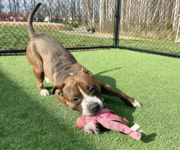
Here’s how animal shelters fixed the canine illness problem


The state’s shelters are open and running smoothly after a canine illness forced them to close for a part of the summer. (Photo courtesy of Faithful Friends)
After a canine respiratory illness spread through the state over the summer causing a statewide closure of many shelters for about a month, shelters found different ways to remedy the situation and reopen successfully.
The Humane Animal Partners cut the number of dogs it houses by about 50% to 30 dogs at a time.
RELATED: Del. restricts movements of shelter, rescue dogs
“The building could hold as many as 60 dogs before, and that was just too many,” said Patrick Carroll, chief executive officer of Humane Animal Partners. “It was overwhelming for the staff, overwhelming for the dogs, it isn’t really the best thing to do health-wise.”
Its $3 million renovated Stanton/Christiana location reopened in mid-August, and will celebrate this week with a ribbon-cutting ceremony.
The event will highlight House Bill 190, signed recently by Gov. John Carney, which modernizes and streamlines Delaware’s Animal Population Control Program.
It updates the current law relating to the Spay Neuter Fund and the administration of that fund to make it easier to administer the fund and animal population control programs.
RELATED: Respiratory illness temporarily shuts 2 shelters’ doors to dogs
Faithful Friends Animal Society, which recently moved to a new location in New Castle took a different approach.
“We definitely had an outbreak that was more virulent than anything else,” said Dr. Karen Sweeney, shelter medicine veterinarian at Faithful Friends. “It was a disease we were seeing throughout the state, and it’s presumed, based on some of the testing [at some of the other shelters] that were primarily dealing with the canine influenza outbreak.”
So, the shelter has started vaccinating its dogs against canine influenza.
Rather than reduce capacity like Humane Animal Partners, Faithful Friends has changed some protocols about how it clears sick dogs.
“We do a little bit more monitoring before we clear them and expose them to our other dogs,” Sweeney said. “It kind of taught us some things of how we can manage even a normal outbreak better.”
The shelter also has a capacity of 60 dogs.
“We designed our dog kennels in this new building a little larger than our old kennels, because you don’t want to cram a lot of animals into small kennels and small spaces,” said Jane Pierantozzi, founder and executive director of Faithful Friends.
The goal is to have higher turnover, she said, and that is done by having healthier animals in larger spaces for them.
“We have dog play groups and walks for the dogs multiple times a day to keep them enriched while they’re waiting for a home,” Pierantozzi said. “All that’s important for their physical and emotional health.”
She said the goal is to not necessarily decrease the capacity, but to lower the animals’ length of stay by increasing the volume of adoptions into forever homes.
It was hard not to intake animals with the number of animals that become homeless for various reasons, Pierantozzi said.
Delaware is just one of a few no-kill states in the county, which means it has a save rate of at least 90% for all cats and dogs that enter its shelters.
“That’s because we partner with the community; it’s really important that the community understands this because we can’t be a life-saving state if people don’t partner with us to foster animals, to adopt animals from the shelters first, instead of buying,” Pierantozzi said.
It really is a partnership, she said, and she hopes the public understands that the virus came through but everything’s under control now.
“It’s something that circulates in shelters, dog parks, kennels, and places where dogs congregate,” Sweeney said. “It’s very contagious, so you see about 80% of exposed dogs get infected when you’re dealing with influenza.”
The dogs in the shelters get medical care, Pierantozzi said, and they get vaccinated. Delaware hasn’t seen a virus like this come through for maybe six or seven years.
“It’s not a common thing,” she said.
Whimsical Animal Rescue/Sussex County Animal Association (WAR/SCAA), a rescue shelter in Seaford, was not impacted.
“We are a small foster-based rescue group that did not have any canine respiratory infection in our dogs,” the organization said. “This impacted all of us, however, because the majority of our adoptions are out of state and we couldn’t place those dogs into homes for over a month.”
Repeated efforts to reach State Veterinarian Dr. Karen Lopez for comment this week were unsuccessful.


Raised in Doylestown, Pennsylvania, Jarek earned a B.A. in journalism and a B.A. in political science from Temple University in 2021. After running CNN’s Michael Smerconish’s YouTube channel, Jarek became a reporter for the Bucks County Herald before joining Delaware LIVE News.
Jarek can be reached by email at [email protected] or by phone at (215) 450-9982. Follow him on Twitter @jarekrutz and on LinkedIn





